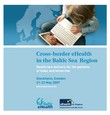 Stockholm, Sweden
Stockholm, Sweden21-22 May 2007
The European regions are facing similar social, political, and economic challenges today and in the future. The health care sectors in particular have to deal with the rising demand for services in addition to limited budgetary conditions. The regions are faced with the demographic changes and the challenge of ensuring that citizens in both urban centres and peripheral areas have the same access to health care services. Thus, access to high quality health care services for all citizens, regardless of where they live, is crucial for the attractiveness and competitiveness of European regions.
The European Union supports two eHealth projects within the Baltic Sea Region: INTERREG III B programme "Baltic eHealth" and "eHealth for Regions". Over 20 partners are participating in the two projects. The partners come from regions covering almost the whole Baltic Sea area and together they pursue the vision of "Health for all" citizens.
The European Commission describes eHealth as "the application of information and communications technologies across the whole range of functions that affect the health sector". In this sense, eHealth is an important step towards providing better quality health care services which are accessible for all citizens, both in urban centres and rural areas.
The common conference "Cross-border eHealth in the Baltic Sea Region" of the two projects will show the project results, challenges, strategies and the projects of the future. The aim is to bring together persons from the health sectors, who are involved in the health processes in the close sense, but also persons from fields such as IT, business, policy, administration, spatial planning and education.
For further information and registration, please visit the "Cross-border eHealth in the Baltic Sea Region" Conference web site:
www.ehealthconference.info